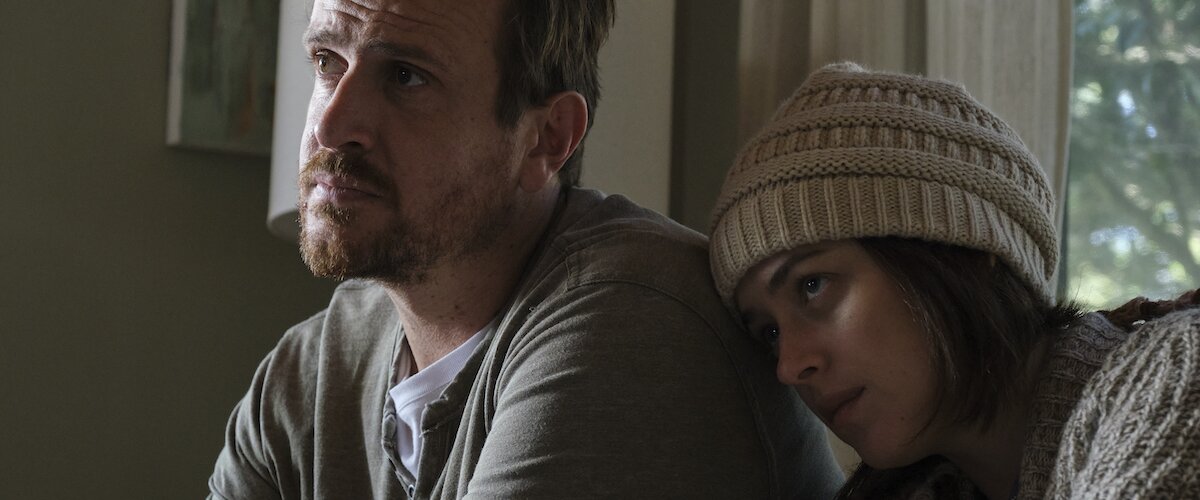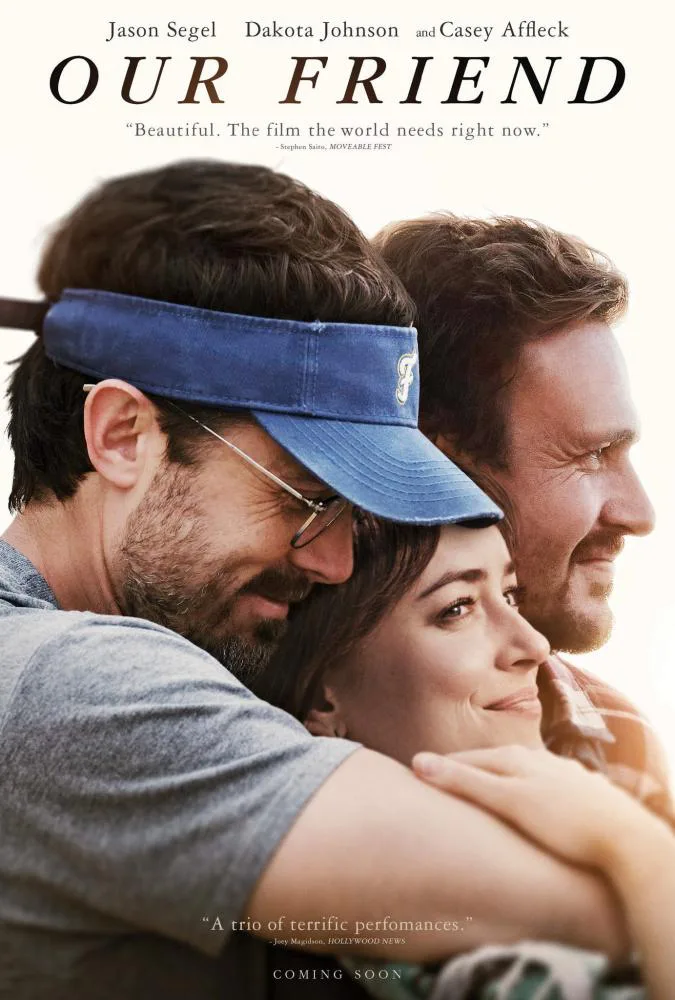“It was a routine death in every sense. It was ordinary. Common. The only remarkable element was Dane. I had married into this situation, but how had he gotten here? Love is not a big-enough word. He stood and faced the reality of death for my sake. He is my friend.”—Matthew Teague, “The Friend,” Esquire Magazine, May 2015
There’s good reason to be slightly skeptical of films that centralize cancer. Too often cancer is used as a plot-point or a short-cut to emotional engagement. In television series, cancer is used to boost ratings. Cancer patients are portrayed as inspirational, enlightened: they are here to teach us how to live. The worst and most bafflingly common “cancer trope” is the one where a young woman dies of cancer, and her boyfriend becomes a better man in the process. These types of films don’t want to deal with the reality of cancer. In a way, the movies are designed to deny reality. One of the most refreshing things about Gabriela Cowperthwaite’s “Our Friend,” based on Matthew Teague’s devastating 2015 essay about his wife’s death and the friend who helped the couple through it, is the film’s strict interest only in reality. “Our Friend” doesn’t make cancer “mean” anything beyond what it already is, and it doesn’t turn cancer into a symbol of something else. In his essay, Teague wrote, “We don’t tell each other the truth about dying, as a people. Not real dying. Real dying, regular and mundane dying, is so hard and so ugly that it becomes the worst thing of all: It’s grotesque. It’s undignified. No one ever told me the truth about it, not once.”
“Our Friend” tells the truth about it.
Matt (Casey Affleck) and Nicole (Dakota Johnson) are a relatively happy couple living in Fairhope, Alabama. She’s an actress with a local theatre, he’s a journalist. They have two small daughters. Life has its bumps in the road, but in general all is well until Nicole is diagnosed with ovarian cancer, the “silent killer.” Things go from bad to worse to terrifying. Their mutual friend Dane (Jason Segel) decides to move in with them during the final year of her illness, to help out around the house, help with the girls, play support staff for a grieving overwhelmed family.
Why would Dane give up his own life like this? As the film makes clear, Dane is at loose ends. He works in a sporting goods store. He says he wants to “start to think about” doing stand-up comedy, not exactly an ambitious choice of words. All of his friends are husbands and fathers now. Dane wants that, too. But after a visit to Matt and Nicole’s house post-cancer-diagnosis, he notices instantly that everyone is overwhelmed. He thinks he could be of use, pick up the slack, do errands, be there for whatever is needed.
Brad Ingelsby’s screenplay sticks fairly closely to Teague’s original essay. When the screenplay deviates, the film loses focus. The tangents feel like tangents, off-shoots of the main narrative. In some cases, these tangents muddy the waters. Teague’s essay jumps around a little bit in chronology, backtracking to explain how he and Nicole met Dane. But Ingelsby goes full-bore into fractured chronology, leaping back 13 years, leaping forward 8 years, back 4 years, and etc. It’s a challenge keeping the timeline straight.
But “Our Friend” is very good where it really counts and that’s on the small details, the everyday life aspect of doing errands, cooking dinner, while your family is going through this harrowing ordeal. Cancer consumes the patient, but it also ravages the family. There’s a beautiful sequence where Matt drives past a playground, seeing happy mothers and children playing on the swings. He is so far away from being able to do that, it’s like he’ll never join that warm carefree circle again. Death makes you self-centered. How can people just keep living their lives when my life is ending? As singer-songwriter Tracy Bonham says: “And the world has the nerve to keep on turning.” “Our Friend” really understands this.
If you don’t believe in Matt, Nicole, and Dane’s friendship, then the film would not work. You believe it. Affleck’s Matt can be a difficult man, prone to gloomy brooding. When he suffers, he suffers mostly in silence, interrupted by explosive impatience or sudden fainting spells. (Yes. He faints. Often.) Nicole is a warm and giving person, and people are drawn to her. She is forgiving, but not a pushover. What is unique here is Dane is friends with both Matt and Nicole. (Teague writes about this dynamic in his essay.) Segel is perfect for this sort of material, with his scruffy kindness, his humorous impulses (his scenes with the children are particularly wonderful), his openness. One can only imagine how awful it would be if Dane were portrayed as some saintly self-sacrificing angel. Segel plays to Dane’s sense of disappointment, his loneliness for a mate, for children of his own. It’s all there. He’s a complicated man, and yet his impulses for friendship are simple and clear. Together, the three actors create a believable sense of shared history.
“Our Friend” is insightful on a lot of things nobody wants to talk about, like caregiver fatigue. To “take a break” consumes the caregiver with guilt. Dane suggests to Matt they go on a short hike. Matt puts up resistance, but Dane wins, and they have a good day out. There’s a quick montage showing neighbors and friends dropping food off on the porch steps. Such a small thing, but so helpful. The film is also truthful about the less positive aspects. Right after Nicole gets diagnosed, friends swarm by the house in support. As Nicole gets sicker and sicker, the friends stop coming by. Only Dane remains.
Teague’s essay is factual about the horrible things cancer did to his wife’s body. “Our Friend” avoids some of the more gruesome elements, but it is honest about the breakdown of Nicole’s personality, her psychosis, as well as her lashing out at Matt in frightening rages. (This is new territory for the gifted Johnson, and she is more than up to it.) Cowperthwaite directed “Blackfish,” a documentary about orcas in captivity. She seems to look at situations without blinking. She doesn’t sugar-coat. She doesn’t sentimentalize. She brought this to bear in 2017’s “Megan Leavey,” a film I reviewed for this site. One could, I suppose, “write off” “Megan Leavey” based on the plot description, but Cowperthwaite’s keen eye for details and empathetic sensibility made it a very powerful film. The same holds true for “Our Friend.”
One critic called Dane’s motives “a mystery.” But it’s not a mystery at all. Segel makes Dane’s actions make sense. It’s not all that complicated, really. Dane recognizes his friends need him, he doesn’t have anything else going on, he moves in. It’s that simple, or at least it’s that simple to Dane. Teague himself described Dane’s choice to move in with them as “ungraspable.” William Butler Yeats’ beautiful lines from The Municipal Gallery Revisited come to mind:
“Think where man’s glory most begins and ends,
and say my glory was I had such friends.”
Being a friend like Dane is a choice. We all have that choice within us. We shouldn’t just wish for a friend like Dane. We should try to be a friend like Dane.
Now playing in theaters and available on demand.




















